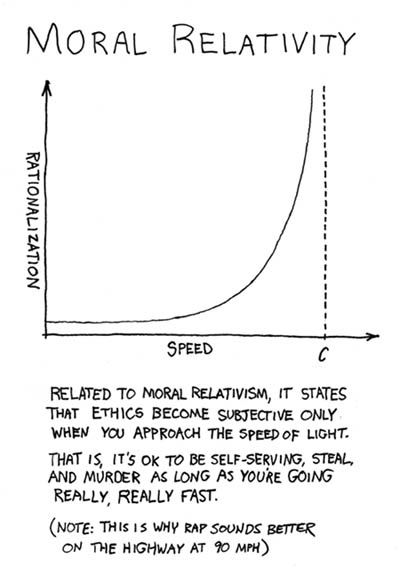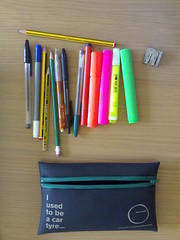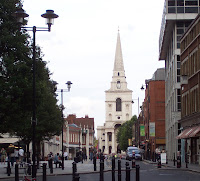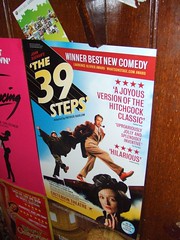I’ve been doing rather a lot of cultural stuff lately, which is nice, as I’m one of those people who always says ‘I’d love to go to X’ and then never gets around to it. First up was, unbelievably, my first ever use of the tkts booth in Leicester Square, where it’s possible to get cheap tickets for performances that day. Of course when I say ‘cheap’ I mean ‘just about affordable as opposed to the normal horrendous price’. I ended up seeing the 39 Steps, which was very good. Originally a book by John Buchan it was, apparently turned into quite a famous film, directed by Alfred Hitchcock. Me being me, of course I’d never seen it. Which did put a slight question-mark over whether I would ‘get’ the stage version which was supposed to parody the film. But I love a good parody, and although I may have been deprived of the odd reference from time to time, there was plenty to find amusing in what was a very high-energy performance by a tiny cast. So definitely worth the (half price) tickets.
Partly to become more active in supporting my lovely city’s artistic endeavours, and partly to give myself a kick up the backside to ensure I actually go to some of the exhibitions I always intend to, I joined the National Portrait Gallery earlier this year. As well as getting free entry to all the exhibitions, there are sometimes members-only events, and I actually decided to go along to one the other day. Essentially it was just an opportunity to get to go around the gallery one weeknight with the benefits of late opening and without the disadvantages of be-rucsacked tourists. The two exhibitions that were the focus were the BP Portrait Award, an annual competition, and ‘Daily Encounters’, a collection of photos from Fleet Street.
The former was, as always, very interesting. I don’t pretend to have any coherent critical capacity of the arts – I gravitate towards things that I find aesthetically pleasing, or emotionally or intellectually stimulating, but I can’t always tell you why the particular work elicits this response. I don’t think there’s any harm in enjoying things without being able to ‘justify’ them, but then, I’ve never been particularly highbrow. Accordingly, I can tell you that I prefer realism to abstraction and, in portraiture, I prefer to see people in some kind of context, rather than just posed in a sterile environment. Thus, I far preferred the picture of the blacksmith in his smithy to the family group in a studio dressed in their best clothes but entirely removed from their normal context.
The latter (‘Daily Encounters’) was a little disappointing actually. It was presented as 'Exploring Britain and Britishness through newspaper photography', but it didn't really do either to that great a degree. I have a very limited knowledge of any kind of history, although I guess if I know a little about anything, it's post-war British social/political history (thank you Andrew Marr). But I didn't really learn anything much about that period, or before then, that I didn't know already. I don't know if perhaps the remit of 'portraiture' and 'Fleet Street' and 'British' was too narrow - certainly it was a shame that the exhibition stopped in the mid 80s, which reflected the journalistic shift away from Fleet Street, but meant that images of a lot of interesting events were omitted. Perhaps they were attempting too much, or I was expecting too much, but either way I felt this missed the mark a bit.
Oh heck, this was supposed to be a review of three things and I've written tonnes without even getting on to the Antony Gormley exhibition at the Hayward Gallery. I think that better become a separate post! To be continued...






































